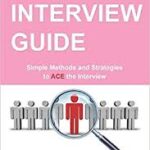The more time you spend preparing for a job interview, the better your chances will be of acing it. You’ll feel more comfortable speaking with the hiring manager if you’re familiar with the company’s products and services.
Research the company. Before your interview, take the time to learn as much as possible about the job and your prospective employer. There are many different resources you can use to find information and news about the organization, its mission, and its plans.
Tap your connections for insider information. Who you know at a company can help you get hired.
Check LinkedIn to see if you have connections who work at the company. Ask them if they can give you any advice that will help with the interview process.
If you’re a college graduate, check with your career office for alumni who may be able to help.
Make a match. Take the time before the interview to make matches between your qualifications and the requirements as stated in the job announcement. This way, you will have examples at hand to demonstrate your suitability for the job.
Practice your responses. Write out your answer in advance for each question and then read it aloud to ensure it sounds natural. Try to keep it short and sweet. You don’t want to come across as the type of person who endlessly drones on about themselves.
Be prepared to show and tell. It can be helpful to remember the tip “show, don’t tell.” For example, rather than stating that you are an excellent problem solver, instead give an example that demonstrates this, ideally drawing on an anecdote from your professional experience.
How to Make the Best Impression
The first impression you make at a job interview, is going to be the most important one. Hiring managers can decide whether you’re a good candidate, or not, within a few minutes of meeting you. These tips will help you make a terrific first impression.
Dress for success. What you wear to the interview is important because you don’t want to be underdressed or overdressed. A three-piece suit can be as out of place as shorts and a t-shirt. Carefully choose appropriate attire, and don’t be afraid to ask the person who scheduled the interview if you’re not sure what to wear.
Be on time or a little early. You definitely don’t want to keep your interviewer waiting, so be on time or a few minutes early for your appointment. If you’re not sure where you’re going, do a trial run ahead of time so you know how long it will take you to get there.
If your interview is virtual, check to make sure that you’re comfortable with the technology ahead of time.
Keep it positive. Always try to put a positive slant on your responses to questions. It’s better to give the impression that you’re more motivated by the possibility of new opportunities than by trying to escape a bad situation. In addition, it’s important to avoid bashing your current organization, colleagues, or supervisor. An employer is not likely to want to bring on someone who talks negatively about a company.
Follow up after the interview. After every job interview, take the time to send a thank-you note or email message sharing your appreciation for the time the interviewer spent with you, and reiterating your interest in the job. If there was something you wish you had said during the interview, but didn’t get a chance to, this is a good opportunity to mention it.


